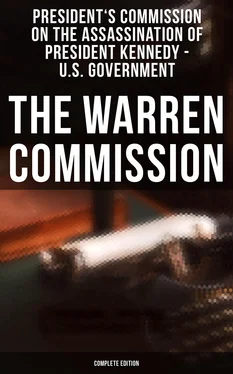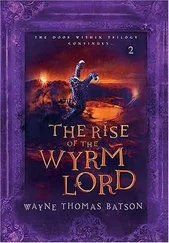Mr. Jenner. During this period, Representative Boggs, the two boys John and Robert were at the military school. They were home during the summer vacation period but otherwise they were in military school.
Mr. Dulles. I think maybe we ought to give the witness a little rest. He has been on for 2 hours.
Hale, have you got anything more you want to ask now?
Representative Boggs. No, I would just like to thank the witness for his cooperation.
Mr. Oswald. Thank you, sir.
Mr. Dulles. Do you have anything? Do you have to go back?
Representative Ford. I am going to stay until we get some notice from the House if we have any call or a vote.
Mr. Dulles. Shall we take just 5 minutes off then and it might be agreeable.
(Short recess.)
Mr. Dulles. Proceed, Mr. Jenner.
Representative Ford. It would be helpful because we are likely to get a call almost any time to go back to the House, if I could ask a few questions.
Mr. Jenner. Go right ahead.
Mr. Dulles. Okay.
Representative Ford. Mr. Oswald, what was your reaction to Lee's discharge from the Marine Corps?
Mr. Oswald. He had an honorable discharge he told me. I had no adverse reaction to it.
Mr. Jenner. Did you have in mind, Representative Ford, the change in the status of that discharge?
Representative Ford. No, I was referring to the circumstances under which he was discharged prematurely. He did get an honorable discharge at the outset but he was released prematurely on a hardship basis.
Mr. Oswald. Yes.
Representative Ford. Were you familiar with that?
Mr. Oswald. I was not familiar with that at the time it was going on. Of course, I was familiar after he was released on that basis. I remember Lee telling me, he said, "Well, I only lack a month," or a few days anyway before his regular release was up and I believe that was all that was said between Lee and I about it.
Representative Ford. When did you learn about the change in his discharge?
Mr. Oswald. Sometime during the year of 1960, through my mother. She had advised me at that time she had received mail for Lee from the Marine Corps or from the Navy Department, stating that generally the reasons he had not notified them of changes of address, and perhaps even to the extent that he had left the country in the manner that he did, that it was going to go before a review board, and that he was to appear before this board to state his case, otherwise it would proceed without him. Then I became aware that the board's decision was an undesirable or a dishonorable discharge, I don't recollect which.
Representative Ford. Did you take any action when you learned of these circumstances to help your mother or to contact Lee about this situation?
Mr. Oswald. No, sir; because at this time in reference to Lee there he had already stopped writing to both I and mother and there was no way that we knew of to contact Lee, and mother said she was going to take care of it and try to have it postponed or something or other, and the board reached a final decision.
Representative Ford. When your mother went to Washington, did she tell you in advance or give you any indication she was going to do that?
Mr. Oswald. No, sir; she did not. I was aware of it after she came back from Washington.
Representative Ford. Did she fill you in in some detail about her return from Washington?
Mr. Oswald. No, sir; she did not. She did not go into any particular detail other than she tried to impress on me she had seen some, as she put it, some very important and influential people in Washington. And that was about the text of the conversation in reference to that.
Representative Ford. Did she volunteer this or did you ask her about it?
Mr. Oswald. She volunteered this because I did not know of the trip to Washington until after she returned from the trip to Washington. She volunteered information to me that she had been in Washington and saw numbers of people, different people.
Representative Ford. The principal information you have about Lee's return from the Soviet Union is included in the letters that you have from Lee?
Mr. Oswald. Yes, sir; that is correct.
Representative Ford. Those will be submitted subsequently.
Mr. McKenzie. They have been submitted already, Mr. Ford.
Mr. Jenner. Excuse me, did you address me?
Mr. McKenzie. The Commission has copies of the letters.
Representative Ford. The Commission has copies and they will be submitted for the record.
Would you care to comment in addition on what you found out from Lee subsequently of his experiences in the Soviet Union. Why he wanted to come back?
Mr. Oswald. No, sir; I never questioned him about that because we covered it, I believe quite fully in our letters. I was, of course, thoroughly convinced and quite happy that he did want to return to the United States and I felt there was no need to go into the reason why he changed his mind because I believe we had covered that in the letters.
Representative Ford. At the time he indicated a desire to come back to the United States, did he ever contact you about funds for that purpose?
Mr. Oswald. No, sir; I volunteered to help him any way I could on that. He turned down the offer. He turned it down one time I believe in letters offering him to come stay at our house when he returned with his wife and the baby.
Representative Ford. When he did return, after having borrowed money from the Federal Government, did he ever ask you for any help and assistance in repaying the loan?
Mr. Oswald. On his arrival in New York City, I believe the date to be June 13, back in 1962, my wife received a telephone call from Special Services Welfare Center located at New York City stating that Lee and his family were present and that they needed funds to reach their destination, Fort Worth, Tex., and the lady that talked to my wife put it to the extent they were unable to help them and if some member of the family was going to help them, they had better do so then. My wife didn't know anything else to say but of course that we would, and this is what I wanted her to say. She called me at my office that day. The banks had closed but I do have a friend in Fort Worth who was employed at a bank, cashier, I believe his title, and I called him and asked him if it would be possible to withdraw $200. This was not at my bank, I would give him a check on my checking account, and at which time I wired the money to the welfare bureau in New York, care of Lee Harvey Oswald.
Representative Ford. And that was the money that they, Marina and Lee, used to get to Fort Worth.
Mr. Oswald. That is correct, sir.
Representative Ford. Did Lee ever repay you for that?
Mr. Oswald. Yes, sir; he did. He had actually spent a little over $100 for the plane tickets and, of course, we met him at Dallas, Love Field, on their arrival there. The next day even though I insisted that he keep it, he returned what he had left from the $200 and he said he would pay me back as soon as he was able to and I told him not to worry about that, but just to take his time.
Representative Ford. How long did it take him to repay the remainder?
Mr. Oswald. I say approximately $110 to $115 during the period he first started to work there in Fort Worth and prior to their departure to Dallas he repaid this $10-$20 a week from his pay check.
Representative Ford. Did you have any knowledge that Lee had become fluent in Russian, in the Russian language, at the time he came out of the Marine Corps?
Mr. Oswald. No, sir; I had not. There is also one of his first letters from the hotel in Russia that he pointed out to me that I didn't even know that he could write or speak Russian. He was being rather sarcastic in his first letters, and he pointed this out. I would answer it that I was not aware that he could speak or could write any foreign language when he was in the Marine Corps and after he got out of it.
Читать дальше












